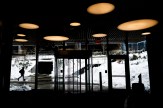Learning medicine without the technology tools
When Emma Stratton and Meghan Ferriera, 2009 graduates of Northeastern University’s physician assistant program, did their last five-week clinical rotation in the Central American nation of Belize, one medical tool they did not miss was access to high-tech diagnostic equipment.
Without CT scanners and similar machines, Stratton and Ferriera found the learning experience more valuable.
Faced with a wide range of clinical emergencies, from shark bites and machete wounds to abscesses, malaria and parasites, “We got to use our diagnostic skills quite a bit because we didn’t have equipment like CT scans available to us, “ said Stratton.
Three days a week, at Belize Hillside Healthcare International in Punta Gorda, the pair treated families who rode as much as three hours on a bus to get there.
Before they went to Belize, neither had done any medical work abroad, said Stratton. Both agreed the experience enriched their education, and made them better future practitioners.
“I’d say it made me a much more confident person, especially when using my diagnostic skills without the benefit of the technology we take for granted here,” Ferreira said.
The pair put those skills to work one day while driving a medical van during a twice-weekly trip to outlying communities. A distressed man ran up to the pair, waiving his arms and yelling. “He was yelling that we had to stop because a little girl had fallen out of a tree,” said Stratton.
The pair tested the girl’s motor skills and examined her eyes before assuring the family that she did not have a concussion and advising them of symptoms to watch for with a head injury.
“The ability to reassure the family that the child would be fine gave us a great feeling,” Ferreira said.
Medical care was in such short supply in Belize that often families of seven or more would swarm into the clinic, sick or not. “We saw one family of 10 (members). Some of the children had nothing wrong. Others were sick. Since it was a rare opportunity to see a medical practitioner, the parents brought the whole family along, and we examined all of them,” Stratton said.
As they prepare to start their first jobs at hospitals in New England, both credit the international experience through Northeastern with shaping their futures.
Ferreira said that when she started studying to be a physician assistant at Northeastern, “I thought, ‘My God, why doesn’t everybody want to do this?’ ”
For more information on the Northeastern University physician assistant program, please visit http://www.northeastern.edu/bouve/programs/mphysassist/mphysassist.html





